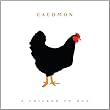 Caedmon. A Chicken to Hug. 2010. CRCD00001
Caedmon. A Chicken to Hug. 2010. CRCD00001With the first notes the years fall away. We are transported back 35 years to the original sound of Celtic folk-rock, before Runrig, before Big Country, before U2. And we are transported once again another 1,300 years back to the golden age of Celtic mysticism, spirituality and Christianity.
Imagine if they could sustain this for a whole album - as the original Caedmon album almost achieved, becoming a classic once some collector picked up one of the original 500 pressings from the dusty shelves of a second hand music shop.
This CD released at the end of last year merits a mention because it is remarkable for its very existence. Caedmon in the 1970s, a Scottish student band, has been classified by some with Parchment in the very narrow category of Christian acid folk. On the whole, the bands did not sound similar - but they did create unique and wonderful sounds. That was recognised when the limited press Caedmon album because a collector's album, routinely changing hands for £1,000 or more. Some 30 years later - with the lead vocalist a vet in the Midlands, they managed to reunite, play some reunion gigs and then produce a CD.
Well, second albums don't have to be the same and bands are allowed to mature and move on. In Caedmon's case they had more than three decades to forge individual lives - and the miracle was that they re-formed, played together and have given us an album of songs that bridge the gap of decades.
In A Chicken to Hug (the source of the album's title is revealed in the bonus track at the end), the instrumentation is a little more sophisticated and the singing a little hoarser than in 1978. So while in 1978, the band did calypso Celtic-prog-folk style, now they do African music (Ouagadougou) in African style. But the cello is still there, there's some mandolin and there are Jim Bisset's electric break-outs from folky melodies. And I don't remember the accordion from the first album.
In fact there is an extensive list on instruments on this album, including a mbira, a fretless bass, a ukelin, a djembe and a bhodran.
The obessions are middle-aged, reflections on lives that have been difficult, joyful and varied - and as a band that have drifted apart in some ways yet remained, Still Here, faithful to youthful aspirations. It's a similar mixture in lyrical content to Sue McClellan's band River, a rare attempt to reflect the real passage of real lives.
So once you pass that first track, don't expect youthful nostalgia. We had that at the live gig - but even more welcome is a band recognising that great music, and especially spiritual music, should be timeless in speaking to the seven ages of humanity.
My only criticism: the original Caedmon album was a classic. The discovery of a live recording was a massive bonus because this is a band that likes to play its instruments and play them well and creatively. It would be good to hear more jamming, more of them letting rip.
Let's hope for more in the near future!
Link to the album's Facebook page

















